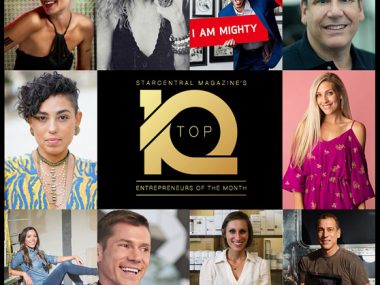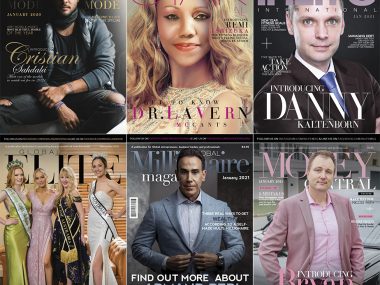Dr. Morgana McCabe Allan works with frustrated entrepreneurs to help them fall back in love with their businesses, achieve their goals and attract the right kind of clients. She helps her clients shift their perspectives and design a new reality for themselves using manifesting, mindset, and healing techniques, alongside powerful organic business strategies. This includes helping them overcome the things which are holding them back, including imposter syndrome, procrastination, and perfectionism. She has a Ph.D. from Glasgow University – an interdisciplinary study that explores how women’s identities and realities are shaped by thoughts, beliefs, behaviours, emotions, and interactions with things, people, places, and ideas.
She started her business after realising she didn’t want to stay in academia. When she found out she was expecting her third child, a baby girl, she felt inspired to change the world. She didn’t want her daughter to be held back by a society which still prioritises masculine ways of being and doing. She was actually writing a book about her Ph.D. when a coach she was working with told her that everyone needed to know this stuff. In the end, she stopped writing the book and turned it into a business, realising that she could make a bigger impact working with people directly.
StarCentral Magazine recently caught up with Dr. Morgana to discuss her journey in the industry, and here’s what went down:
When did your entrepreneurial flair first reveal itself?
When I was three, my parents took me to a movie audition where they were looking for a five-year-old child. Somehow, I not only talked myself into the part, but they thought I was so cute they kept in the things I was saying, which got me upgraded to a speaking part. I was making more money than my parents put together, just based on me showing up and being me. That was my first time selling myself to someone! At seven, I started working in my mum’s business, and at eight, I started my first proper entrepreneurial endeavour, breeding and selling small pets to local pet shops and families.
How did your life look like before being an entrepreneur?
Before I started this business, I spent seven years doing my Ph.D. on how our realities and identities are co-created with all the people, places, things, ideas, social constructs, embodied emotions (and more) that we interact with. Being a researcher is a lot like entrepreneurship, where you’re continually pitching for funding and opportunities and your time and performance are self-directed. It was a great finishing school for my entrepreneurial childhood, teens, and twenties.
As an entrepreneur, what is it that motivates and drives you?
I’m motivated by creating a positive impact. Entrepreneurs have a unique opportunity to lead culture change because we get to find new edges, pioneer new approaches, and bring what we create to others in ways that the market responds very fast.
In one word, describe your life as an entrepreneur and explain why.
Bliss.
I get to work with the most amazing people worldwide and co-create positive impacts with them that have deep ripple effects. In doing so, I can use my best skills and stories, my unique research, and my whole being in my work, and be creative, spontaneous, and supported at the same time. My husband gets to be home with our kids, supported by a team (e.g., housekeeper, cleaner etc.). And, although we’ve not fully actualised this part thanks to Covid, because my work is location-independent, I live every day knowing
we’re creating a life with the scope for future adventure for us.
What were your top three motivations for starting your business?
I found out I was expecting my third child – my first daughter. And I really felt the gravity of so much of why I’ve studied and experienced sink in then and the feeling that if I weren’t part of creating change, my daughter’s future would be a repetition of my past. I wanted to be part of creating a better world for all of my children.
I also wanted to be part of creating something better for everyone. To share the important aspects of my years of research in ways that are accessible and meaningful for people and empower others to leave behind toxic ways of doing and being (in business and life) and create changes, they believe in.
And on a personal note, I wanted to facilitate my husband leaving his 9-5 job and create space for him to find out who he really is and what he really wants from life.
What do you put your success down to?
First and foremost, I would say that it’s related to my relationship with myself. I accept that I will make mistakes, and I love myself. I understand that I will grow, my work will change, and it may look messy sometimes from the outside. So I hold myself to the standard of ‘the best I am able and committed to my growth, but I fundamentally embody the knowledge I’m safe in my own hands because I trust in myself and my integrity.
What would you say are the key elements for starting and running a successful business?
You don’t have to be the best or the only one, but you do need to have a really compelling reason why you are doing what you’re doing. One that gets you out of bed every day and is also deeply attractive to others. You need mindset work, money mindset work, and to heal your wounded parts because otherwise, you’ll find yourself still on the start line even years later. And you need a community of people who are on the same path – some who are going where you’re going and some who have been where you are going, because they are the people who will understand you when your close network start to wonder what on earth you are doing with your life (especially if, like me, you walk away from what was a successful career-for-life kind of path).
What are the three biggest challenges you have faced growing the business, and how did you overcome them?
One of the biggest challenges came when I hired an ads company to run Facebook ads for us. On the very first day of live ads, they made grievous errors in judgment which got my account permanently banned from ever running ads again. I was faced with walking away from audiences thousands strong and starting over. Choosing to see it as an opportunity to take a step back and become even more focused was a game-changer. I doubled the business virtually overnight, and we became less reliant on social media.
Our second challenge came out of the first one – we then faced a long process of chasing that company through every means available to hold them accountable for their conduct. It turned out they were very disreputable and were covering it up with at least seven different business name fronts and it really highlighted the extent to which I’d not done due diligence. I hired the guy because I liked him, but he was essentially a con artist. That was tough because I made a mistake I thought I’d learned a long time ago. Putting procedures in place for how we evaluate companies we will potentially work with helped to overcome that one.
Another of the challenges was trying to balance three businesses and grow them all and stay healthy in the process. As much as I really loved the two collaborations and I loved learning at triple the speed, I had to make the call to focus on this business. It was a hard but necessary decision to secure this business’s growth and my health.
Does the loneliness of the entrepreneur really exist?
I personally am not a lonely entrepreneur, I have an amazing community of soul sisters around the world in my clients and collaborators. But I do see that it exists – most of the entrepreneurs who come to work with me are lonely and have always felt in some way like an outsider.
We have many in our client community from the BIPOC, LGBTQ+, and neurodiverse communities (all of which I’m intimately connected to, as a neurodiverse, bisexual woman with invisible black heritage). Part of my work is connecting people with one another in ways that foster real, lifelong connections.
As you grew the business, what have been some of the most important leadership lessons you have learned?
One of the most important ones I learned long ago but which I always come back to is that it’s essential that you’re attending to your own personal growth and well-being as a leader. It is important to understand your team and their actions to have a coach, therapist, practitioner, and/or other support that help you show up as emotionally whole and ready to respond with curiosity. If you’re not at your best, you’re not going to see the best in others.














